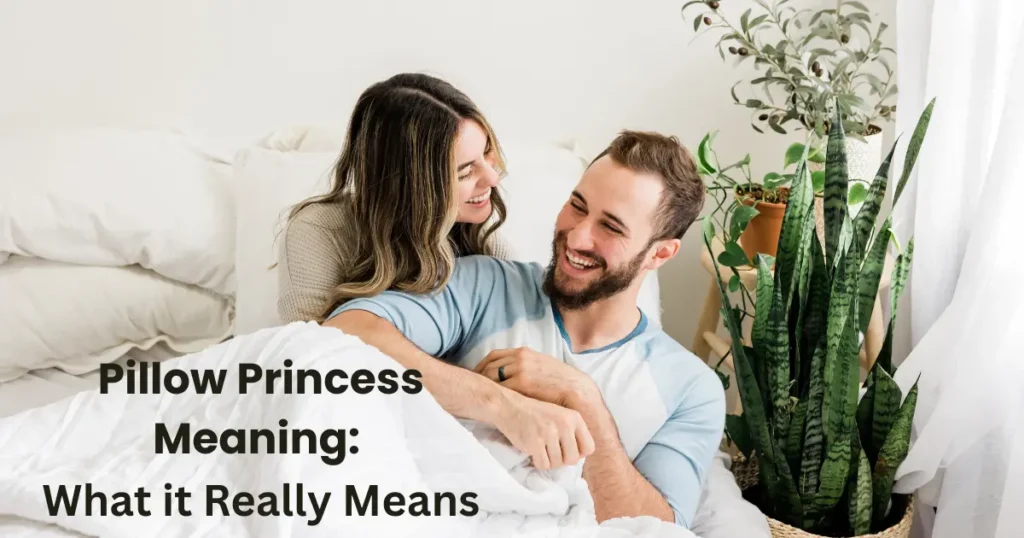Last updated on February 6th, 2026 at 12:50 pm
Have you ever wondered about the pillow princess meaning and why it’s talked about so much in modern relationships? This term often comes up in conversations within LGBTQ+ communities and beyond, but many people still feel unsure about what it really means.
Understanding the pillow princess meaning is important—not just out of curiosity, but also for building respectful, fulfilling connections. It’s not just a label; it reflects comfort, communication, and consent in intimacy.
In this article, we’ll explain what being a pillow princess really means, where the term came from, how to identify it, and whether the label helps or harms. Let’s clear the confusion and bring clarity to this often misunderstood term.
Key Takeaways
- A pillow princess is someone who prefers to receive sexual pleasure and usually plays a passive role in intimacy.
- The term originated in lesbian culture in the 1990s and is now widely known and used across social media.
- Being a pillow princess is not wrong. It’s a sexual preference that works well when both partners agree and communicate.
- Some people view the term negatively, but others have reclaimed it as a label of comfort and pride.
- Talking openly about needs and boundaries is the most important part of any intimate relationship.

What Does Pillow Princess Actually Mean?
The pillow princess meaning refers to a person—most commonly a woman—who enjoys receiving sexual pleasure but typically does not give it back during intimate moments. In short, a pillow princess is someone who prefers to be on the receiving end and usually plays a more passive role during sex.
Although it is mostly used in lesbian and queer female relationships, anyone, regardless of gender or sexuality, can be a pillow princess. For many people, this role is a matter of comfort, emotional safety, or personal preference—not laziness or selfishness.
As sex therapist Dr. Laurie Mintz explains,
“A pillow princess is not about laziness but about choice. Some people feel more comfortable receiving than giving, and that is okay in a healthy relationship.”
Meaning of Pillow Princess in Relationships
In relationships, especially queer ones, being a pillow princess simply means preferring to receive rather than take an active role. This can include not initiating intimacy, not reciprocating physical touch or oral sex, and enjoying being cared for during intimate moments.
It’s important to note that being a pillow princess does not mean someone is a bad partner. It becomes a problem only if the dynamic leads to one-sided intimacy, unmet needs, or resentment. This can also trigger insecurity if one partner feels emotionally or physically neglected.
What matters most is communication and mutual agreement between partners.
Origin and Cultural Background
The phrase “pillow princess” first became popular in lesbian communities during the 1990s. It was often used to describe women who preferred being pleasured by their partners but did not return the favor. Over time, it became a more widespread term and even began appearing on dating apps, social media, and in everyday conversation.
Today, many people have reclaimed the label as a way to express their sexual identity without shame. Hashtags like #PillowPrincess on TikTok and Instagram have millions of views, showing how common and accepted the term has become. Modern relationship terms like ‘pillow princess’ are continuously shaping how we discuss intimacy.
How Can You Tell if a Girl Is a Pillow Princess?
If you are wondering how to tell if someone is a pillow princess, here are a few signs that may indicate it:
- She prefers to receive pleasure and rarely initiates or reciprocates
- She enjoys being in a passive role during sex
- She feels more comfortable lying back and letting her partner take the lead
- She may avoid giving oral or manual stimulation
- She often communicates her enjoyment through reactions rather than actions
However, these are just general observations. Everyone is different, and the best way to know is by having open and honest conversations about sexual preferences.
Relationship counselor Dr. Emily Morse says,
“Being a pillow princess isn’t a problem unless it creates imbalance or misunderstanding in the relationship.”
Is Being a Pillow Princess a Positive or Negative Stereotype?
The term pillow princess can be seen in several different ways, depending on the situation and perspective.
Positive
Some people see it as a valid and empowering sexual preference. In many relationships, one partner may enjoy giving while the other enjoys receiving, and both are happy with the arrangement.
Neutral
Others use the term simply as a descriptor, without any judgment. It’s just part of who someone is.
Negative
Some critics view the term as a sign of selfishness or a lack of effort in intimacy. This negative view often comes from traditional ideas about what sex “should” look like.
Relationship therapist Dr. Sarah Johnson explains,
“True intimacy depends on mutual effort. When one partner always gives and the other always takes, it can lead to long-term dissatisfaction unless both people openly agree to that dynamic.”
What Is Another Name for Pillow Princess?
There are a few other words or slang terms that are sometimes used in similar contexts, though not all carry the same meaning:
- Pillow Queen – A playful alternative with similar meaning
- Mattress Queen – A less common variation
- Starfish – Often used negatively to describe a very passive partner
- Bottom – A more general term for someone who prefers receiving
- Passive Partner – A neutral term used in some relationship discussions
While these terms are used in different communities, it is important to use them respectfully and only when the person is comfortable with the label.
Are There Any Statistics About Pillow Princesses?
While there is no official data on how many people identify as pillow princesses, broader studies help us understand how common this dynamic is.
According to a 2024 report by the Kinsey Institute, couples who have open conversations about their sexual preferences are 42 percent more likely to report higher satisfaction in their relationships.
Another study published in early 2025 in the Journal of Sexual Medicine found that intimacy tends to improve when both partners feel they are equally engaged in giving and receiving pleasure.
Further academic research highlights that intimate discussions centered on individual desires and comfort zones are crucial for fostering mutual understanding and satisfaction in relationships, regardless of specific roles.
The popularity of hashtags like #PillowPrincess on TikTok, which has received over 35 million views, shows that this topic is both widely recognized and actively discussed online.
Real-Life Experiences
Here are a few stories inspired by real conversations:
A Comfortable Role
Jamie, a queer woman in a long-term relationship, identifies as a pillow princess. She says, “It’s just how I feel most comfortable. My partner knows this, and we’ve talked about it. We’re both happy with the way things are.”
A Learning Moment
Sam realized they might be a pillow princess after attending an LGBTQ+ workshop. Their partner had mentioned it before, but the workshop helped them understand that it’s okay to own that identity—if the relationship remains open and respectful.
Finding Balance
Taylor struggled with guilt about not being as active during intimacy. After a gentle conversation with their partner, they learned that mutual understanding matters more than trying to fit into anyone else’s expectations.
Final Thoughts
The meaning of pillow princess is simple: it’s about someone who enjoys receiving pleasure more than giving it. While the label may carry different meanings depending on who uses it and why, the most important factor in any relationship is mutual respect and understanding.
Whether you identify with this term or are just curious about it, remember that everyone has different preferences. What matters is how you and your partner communicate and connect.
As Dr. Justin Lehmiller, sex researcher, puts it,
“Healthy intimacy is built on communication, not assumptions. There’s no one right way to experience pleasure—only what works for both people involved.”
FAQs
What does pillow princess actually mean?
It means someone who likes to receive pleasure during sex but usually does not give it back or is more passive.
How can you tell if a girl is a pillow princess?
She may prefer being pleasured, avoid initiating intimacy, and enjoy a relaxed, receptive role.
Is being a pillow princess a positive or negative stereotype?
It depends on how it is used. For some, it’s empowering. For others, it may be seen as selfish. What matters most is consent and communication.
What is another name for pillow princess?
Other names include pillow queen, mattress queen, starfish, bottom, and passive partner. Not all terms are neutral, so be mindful of how they are used.

